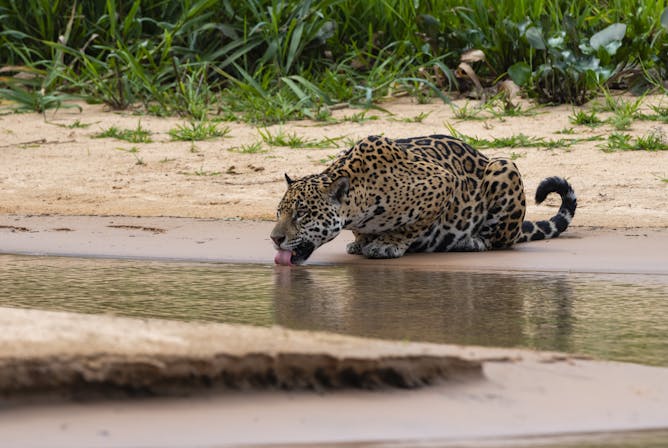|
|
|
|
Covering the pandemic has posed a number of challenges for our newsroom, not the least of which is deciding how to cover new scientific studies in a way that gives readers the latest data while also reflecting the uncertainty in emerging research. This article, Why we can’t ‘boost’ our way out of the COVID-19 pandemic for the long term, walks that line very well, giving people practical information based on the new research and – crucially – explaining how scientists themselves interpret the latest scientific research. Immunologists Prakash and Mitzi Nagarkatti from the University of South Carolina explain how the immune system responds to the current
COVID-19 vaccines and why retooled vaccines and annual shots are likely.
Jaguars once roamed as far north as the Grand Canyon but today are largely confined to locations south of the border with Mexico. Two wildlife biologists have studied jaguar populations and explain the importance of wildlife corridors, one of which in this case is partially blocked by a border wall. “Increasing connectivity – linking small patches of habitat into larger networks – is a key strategy for conserving large animals that range over wide areas and for maintaining functional ecological communities,” they write.
One of the biggest stories in biotechnology over the past year was the FDA approval of Aduhelm to treat Alzheimer’s disease. In the latest twist, Medicare earlier this month finalized a decision to cover only those patients who are participating in clinical trials, in sharp contrast to the FDA’s approval. But does the drug actually work? Physician Andrew Williams digs into this question in detail and, in doing so, reveals the complex challenges in developing treatments for Alzheimer’s.
Also in this week’s science and research news:
If there’s a subject you’d like our team of science editors to investigate, please reply to this email.
|

|
Martin La Monica
Director of Editorial Projects and Newsletters
|
|

Although the COVID-19 vaccines have saved millions of lives, they have been insufficient at preventing breakthrough infections.
Andriy Onufriyenko/Moment via Getty Images
Prakash Nagarkatti, University of South Carolina; Mitzi Nagarkatti, University of South Carolina
Research suggests that too-frequent immunizations may lead to a phenomenon called “immune exhaustion.”
|

A jaguar in Brazil’s Patanal region.
Sergio Pitamitz /VWPics/Universal Images Group via Getty Images
Ganesh Marin, University of Arizona; John Koprowski, University of Wyoming
Keeping landscapes connected can help protect wild animals and plants. In the US Southwest, border wall construction is closing off corridors that jaguars and other at-risk species use.
|

An illustration of amyloid plaques within the human brain, characteristic features of Alzheimer’s. By 2060, approximately 14 million Americans are expected to have the disease.
Kateryna Kon/Science Photo Library via Getty Images
Andrew Williams, Albert Einstein College of Medicine
Although Medicare has agreed to pay for Aduhelm, its coverage comes with restrictions.
|
|
|
-
Iain Boyd, University of Colorado Boulder
Russia’s use of hypersonic missiles in Ukraine has put the weapons in the news. Next-generation versions under development could dramatically alter national and global security.
-
Nicholas P. Sullivan, Tufts University
One of the oldest industries, fishing, is entering the world of advanced analytics and data-driven planning. With oceans under stress and key fish stocks dwindling, can precision fishing help?
-
Raymond J. Cho, University of California, San Francisco
Many doctors currently diagnose skin conditions by eye. Advances in molecular testing could lead to more precise and accurate diagnoses for ambiguous rashes and skin lesions.
-
Elizabeth Tricomi, Rutgers University - Newark ; Wesley Ameden, Rutgers University - Newark
People tend to dislike uncertainty and risk – two things that are hard to avoid completely during a pandemic. That’s part of why it can feel especially draining to make even small decisions these days.
-
Dana Al-Hindi, University of California, Davis; Brenna Henn, University of California, Davis
The South African Khoe-San communities are no strangers to exploitative research. One research team is trying to provide genetic ancestry results to community members. But they still face many challenges.
-
Brittany Larsen, Iowa State University
Research has been inconclusive on the degree to which drinking alcohol leads to the growth of harmful fat. But a new study suggests that beer and spirits are far bigger culprits than wine.
-
Robert Lempert, Pardee RAND Graduate School; Elisabeth Gilmore, Carleton University
Solutions already exist. What’s holding humanity back is the will to get past the status quo and embrace innovation.
-
Steven Walkley, Albert Einstein College of Medicine; Melissa Wasserstein, Albert Einstein College of Medicine
Deciphering the biological pathways behind rare genetic diseases often involves assembling a team of specialists to work closely with the family members of those affected.
|
|
|
| | |
| | |
| |
| |
| |
|
|
|